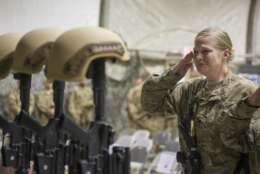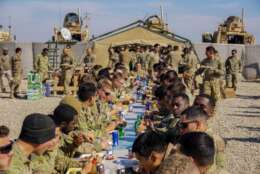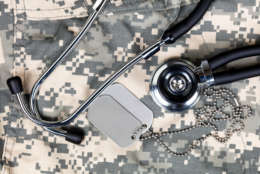Defense
-
The Army's Fusion Directorate is a new approach to help victims of sexual assault and harassment that will give soldiers one more avenue to seek help.
October 06, 2021 -
The past 18 months have thrown a wrench in many of the military’s plans, but the supply chain is one that has taken a particularly hard hit. Army Materiel Command had a handful of backups that caused issues for the supply chain during the height of the coronavirus pandemic.
October 06, 2021 -
All DoD clearance holders are now enrolled in "continuous vetting, with the program now expanding to other agencies and looking to pull from more data sources.
October 06, 2021 -
The Pentagon issued its guidance for civilian employees on Monday, giving workers a little less than two months to get inoculated.
October 05, 2021 -
Through the Lab's Air and Space Forces Science & Technology Front Door Project officials hope to nurture partnerships with S&T experts
October 05, 2021 -
In today's Federal Newscast, the Department of Defense put out a timeline for when civilians must get their first and second shots based on the type of vaccine in order to be in compliance.
October 05, 2021 -
TRICARE beneficiaries who get their drugs through home delivery or through a retail pharmacy will pay anywhere from $1 to $8 more in copayments starting in 2022.
October 04, 2021 -
The now-infamous "Fat Leonard" case stretched far and wide into the Navy contracting community and its officer ranks, and it may not be over yet.
October 04, 2021 -
In today's Federal Newscast, the Defense Department is seeing troubling new figures in military suicide rates.
October 01, 2021 -
Jay Bonci took his first government leadership position in August, following a career as a technology executive at Akamai.
September 30, 2021 -
Soldiers waiting for guidance that allows beards will have to keep waiting.
September 30, 2021 -
Eating disorders in the military have risen 26% in recent years.
September 29, 2021 -
For how the case turned out, Federal Drive with Tom Temin talked with Smith Pachter McWhorter procurement attorney Joe Petrillo.
September 29, 2021 -
Appropriators wants to give the Coast Guard about $13.2 billion.
September 28, 2021 -
The Transportation Department and the FDA have new chief information officers, while the Air Force and the Homeland Security Department have new chief technology officers.
September 27, 2021
















